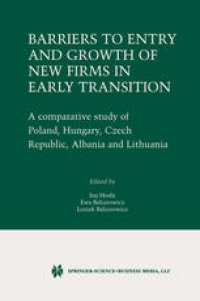
Ebook: Barriers to Entry and Growth of New Firms in Early Transition: A Comparative Study of Poland, Hungary, Czech Republic, Albania and Lithuania
Author: Ewa Balcerowicz Leszek Balcerowicz (auth.) Iraj Hoshi Ewa Balcerowicz Leszek Balcerowicz (eds.)
- Tags: International Economics, Political Science general, Economic Growth
- Year: 2003
- Publisher: Springer US
- Edition: 1
- Language: English
- pdf
inefficient and uncompetitive enterprises especially from the over-grown industrial sector. These initial conditions meant that, in the early stages of transition, the volume of entries and exits will be, by necessity, very high reflecting the large scale changes that had to take place before these economies attain a macroeconomic structure consistent with their level of development and with the needs of a market-based economy open to internationalcompetition. One of the main elements of the reform programme in all economies in transition was the liberalisation of entry conditions. Along with the liberalisation of prices and foreign trade, appropriate measures facilitating the establishment of new enterprises were approved in the very early phase of reforms in all of these countries. The effectiveness of liberalised entry conditions, of course, depends on the presence of appropriate legal and institutional framework in which new firms will operate. The establishment of a conducive legal and institutional environment, however, takes much longer. In practice, new firms come into existence before the rules of the game are properly established. These rules develop gradually and are not always, and everywhere, consistent with the aim of liberalising the entry conditions. The conditions facing new firms, therefore, have fluctuated in some countries in accordance with changes in the political environment and in line with the strength of different lobbies and interest groups.
This book is about barriers to entry in early transition. It analyses the barriers faced by new private firms in five countries at different stages of transition: the Czech Republic, Hungary and Poland as the front-runners of the process, and Albania and Lithuania which followed them later. It is now well established that the new private firm sector is the engine of growth in transition economies. But the entry of new firms is closely related to the nature of the existing regulatory and fiscal framework, specifically the registration and licensing requirements, rules on sale or lease of real estate, export and import regulations, and taxes and contributions. These barriers invariably lead entrepreneurs to conduct some or all of their business outside the official economy or, in some cases, discourage them from entry altogether.